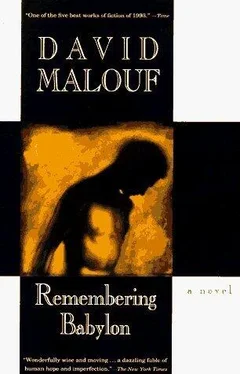The stretch of smothering darkness that followed was longer than any stretch of daylight, and space too lost all dimensions. Getting up in the pitch blackness, she would set her foot to the ground, and, with one hand held in front, set off unsteadily for where the water butt stood, ten paces off beside the door. It was like crossing a continent, step by step, with the darkness infinitely expanding ahead and no visible marker on either side. At last her knuckles knocked against wood, she found the dipper, her lips touched a familiar coolness that was like light in her skull.
After such nights, the way back to normality was through habit: matchflare, the worrying of flame out of chips, six mugs unhooked and set down on the table, children, with the puffiness of sleep still on them, not yet come in from the dreams they had been off in, coaxed back to their daylight selves. Little Meg smelling of milk and eager still to cling on, Janet chewing the end of her plait, Lachlan with something distant, almost combative in his look, as if the smoky hut with its familiar objects and smells was not what he had been expecting or was willing for the moment to accept; Jock, as always, finding it hard to get started, elbows on the table, head, all blond tufts, in his swollen hands, the bared neck showing its wrinkles, coarse and pitiable. He would have to shuffle along the form to make room for the girls. He did it without speaking. The girls accepted it. They were used to his glooms. ‘Lachlan,’ she would say for the second time, but low, not to draw her husband’s attention.
The boy, slowly pulling on his pants, would make a face and pretend not to hear. If he held back long enough, he thought, Gemmy would offer to go and split the wood she needed. He would get off.
‘Naw Gemmy,’ she insisted. Gemmy with his doited look would be stumbling about in a light-headed way, eager at an instant for any task she might have for him, all headlong incompetence, and with no hint of the dark places to which the night might have taken him. ‘That’s Lachlan’s job. Lachlan! If I hae to speak to ye again —’
Jock would raise his head, and Gemmy, hearing the iron in her voice, and fearing the blows that might come — not to him — would hop about in an agony of distress. ‘For the Lord’s sake, Gemmy,’ she would tell him, ‘be still noo and drink yer tea.’
She was establishing the precarious order that in just a moment now would make the day lurch and move forward on its ordinary course. ‘Come on, lad,’ she urged, her tone a little easier, ‘stir yersel’ and fetch ma wuid.’
IT WAS George Abbot’s custom in the late afternoon to go out with a book, usually a French one, since he was keen, even here where he had no opportunity of practising it, to keep up his proficiency in the tongue. The slim volume in his pocket, its scrolled lettering upheld by putti, represented escape from his own nature and the humiliations and mean insufficiencies of his schoolmaster’s existence, but even more importantly, kept open in him, by employing the talents that would be adequate to it, the hope of a kinder future.
He had several favourite retreats. There, the book on his knee and his boots in the dust, he would sit — always alert for ants — in the peppery scent and dull blaze of a tropic afternoon; but his head would be in another place altogether (call it Paris) where the words his soul danced to, sensibilityé, coeur, paradis , relieved him of his bear-like heaviness and rough colonial boots, and all around, the scrub, as the word paysage lit it, assumed new but familiar colours, then opened in avenues, at the end of which, among drooping foliage, a columned temple glowed, where the crude needs he was assailed by fell away as he stepped into the company of a heroine, demanding but also subtly compliant, with the most delicate wrists, and a delectable, angelic little knowing upper lip, whose name was Ursule, or Victorine.
One day he was tramping along to a place where the entry into this world was easy, when he was hailed by a voice on the track behind him, and when he turned a woman was there, an old woman in brown, rather squat, bareheaded, and wearing boots that were a size too big for her. He recognised her immediately though they had never been introduced.
‘That’s lucky,’ she called. She carried a sack over her shoulder and was dragging behind her a good twelve feet of fallen branch. He stood with his book in his hand and waited for her to catch up.
‘Here,’ she said, as she came up beside him, ‘take this,’ and passed the end of the branch to him. ‘I can manage the rest.’
He had heard of this. Her name was Hutchence. She lived three miles out on the Bowen road, not in a hut but in a real house, and regularly had a load she wanted carrying or a job out there she wanted doing. The boys and young men of the settlement, Hec Gosper, Jake Murcutt, the older Corcorans, went in dread of being collared and dragged off to dig a ditch or lift a piece of unwieldy furniture. George had believed he would be exempt; that she would see at once, even if she did not recognise him, that he was not a farm boy like the Corcorans or Hec Gosper, to be hailed and commanded. But when it happened he couldn’t see how he could protest without appearing foolish; he found himself, as mildly as any other youth of the place, pocketing his book, swallowing whatever mild affront he felt to his dignity, and dragging along beside her.
The branch was heavy, he wondered how she had come so far with it, but he was strong, it gave him no trouble. Only he sweated in his heavy jacket and had, more than once, to stop and mop his brow.
‘It’s alright,’ she told him. ‘You take your time. George — is that what they call you?’
She was a tough old body, not quite what she appeared. Though she had too much of the domestic about her to be a source of mystery, he could see quite well that she might present a puzzle. No one knew where she came from — that is, she had vouchsafed no information — or how she could afford to build a real house, or why of all places she had chosen to do it here, or what relation she bore, if any, to the young woman who lived with her, whose name, he knew, was Leona. They had come down, it was said, from the Islands, from Macao, or maybe it was Malacca, and while their house was building had roomed with a widow in Bowen — though no one knew anything of them in Bowen either, save that they had come on the steamer with a whole household of furniture, real furniture of a kind people had never seen, carved chests, wickerwork lounges, three or four elaborate birdcages, and seemed quiet and respectable enough, except for the accent, which the older lady had and the younger did not.
When the house was finished whole troops of people had come out from Bowen to see it; some because it was such a wonder — Bowen, for all that it was a town, had nothing like it; others in the hope that the house, once it was set up, with all the cane chairs in place and the carved chests there to be opened and shown, and the beds made, and one or two pictures hung, might solve the mystery at last by giving away what the ladies themselves would not. But they were disappointing even in this. The house might have flown through the air and landed, plump down, from some seaport up north that they had barely heard of, it was so unlike anything you would see here. If it had information to give away, they couldn’t fathom it. It was in a language they could not read.
It was very light and airy, very open. The cane furniture gave it an easy look, but worried them. A chair ought to be solid. All this lacy lightness suggested — but there they were baulked. Their minds stopped short. They sat in the chairs, and from that vantage looked around at the tongue-and-groove walls, which were mostly bare, but no answer came to them. Was it the past or the future they were looking at? If the past, it was not their past. If the future — well, on the whole they did not care for it. Nor did they care for the fact that Mrs Hutchence, once she was in her own home, turned slovenly, as she had not been when she lived at Mrs Blaine’s. Her bombazine was all spattered with mud, she wore boots — well so did they, most of them, but they didn’t live in a house with five rooms plus verandah, with furniture of woven cane, and serve tea in china cups, bone china, Bavarian it seemed, or have a daughter or goddaughter, or niece perhaps, or companion, who wore her hair with a comb in it and looked like a large, dark-eyed doll.
Читать дальше












